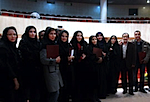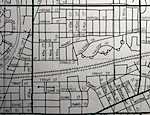Friday, December 16, 2011
By CHRISTOPHER BUCKLEY [The New Yorker] – When we met for another lunch, one that lasted only five hours, he was all a-grin with pride as he handed me a newly minted paperback reissue of Wodehouse with “Introduction by Christopher Hitchens.” “Doesn’t get much better than that,” he said, and who could not agree? Continue reading “Christopher Hitchens, Oscar Wilde, Bertie and Jeeves.” »
Tuesday, December 13, 2011
 By JAMES GARDNER [Wall Street Journal] – “Bruges-La-Morte,” a tale of obsessive love, is a Symbolist novel, perhaps the Symbolist novel. The movement (officially promulgated by Jean Moréas in his “Manifeste du symbolisme” of 1886) is best understood as a vague composite of moods and formal preoccupations that pervaded the music and art of that era, no less than its poetry and prose. Its spirit is elusive and disengaged, shy of emphasis and outright utterance. Perhaps its most concise expression is Paul Verlaine’s “Art Poetique”: “Seek that which is vague and dissolves in air, that which has nothing weighty or imposing…not colors, but rather half-tones.” But it can also be defined by its mysticism and morbid preoccupation with death, its swans and lilies, its obsession with women’s hair. These elements come together in “Bruges-La-Morte.”
By JAMES GARDNER [Wall Street Journal] – “Bruges-La-Morte,” a tale of obsessive love, is a Symbolist novel, perhaps the Symbolist novel. The movement (officially promulgated by Jean Moréas in his “Manifeste du symbolisme” of 1886) is best understood as a vague composite of moods and formal preoccupations that pervaded the music and art of that era, no less than its poetry and prose. Its spirit is elusive and disengaged, shy of emphasis and outright utterance. Perhaps its most concise expression is Paul Verlaine’s “Art Poetique”: “Seek that which is vague and dissolves in air, that which has nothing weighty or imposing…not colors, but rather half-tones.” But it can also be defined by its mysticism and morbid preoccupation with death, its swans and lilies, its obsession with women’s hair. These elements come together in “Bruges-La-Morte.”
Continue reading “In Bruges, with the Symbolist man of the crowd.” »
Thursday, December 8, 2011
By GARY GUTTING [New York Times] – In writing about intellectuals, my temptation is to begin by echoing Marianne Moore on poetry: I, too, dislike them. But that would be a lie: all else equal, I really like intellectuals. Besides, I’m an intellectual myself, and their self-deprecation is one thing I really do dislike about many intellectuals.
Continue reading “‘I really like intellectuals. Besides, I’m an intellectual myself’.” »
Thursday, December 8, 2011
By ALAN WHITE [New Statesman] – During a discussion about War Music, I mentioned [Christopher] Logue’s use of modern martial metaphors, such as Napoleon, Rommel and the bomb, to describe the action between the Greeks and Romans – at which point he interjected: “It’s funny that you group those three together. Napoleon and Rommel, perhaps, but not the bomb.” Why? “Because the bomb is strangely outside military things. It is the military who detonate these things, but it passes much more into the realm of politics.”
Continue reading “Logue: the very master of a modern martial metaphor.” »
Wednesday, December 7, 2011
By WILLIAM PANNAPACKER [Chronicle of Higher Education] – Contrary to many futuristic projections—even from bibliophiles who, as a group, enjoy melancholy reveries—the recent technological revolution has only deepened the affection that many scholars have for books and libraries, and highlighted the need for the preservation, study, and cherishing of both.
Continue reading “Gratifying the desires of the analog bibliophile.” »
Saturday, December 3, 2011
By Maurice Maeterlinck.

M. Maeterlinck.
IT IS NOT UNREASONABLE to believe that the paramount interest of life, all that is truly lofty and remarkable in the destiny of man, reposes almost entirely in the mystery that surrounds us; in the two mysteries, it may be, that are mightiest, most dreadful of all–fatality and death. And indeed there are many whom the fatigue induced in their minds by the natural uncertainties of science has almost compelled to accept this belief. I too believe, though in a somewhat different fashion, that the study of mystery in all its forms is the noblest to which the mind of man can devote itself; and truly it has ever been the occupation and care of those who in science and art, in philosophy and literature, have refused to be satisfied merely to observe and portray the trivial, well-recognised truths, facts, and realities of life. And we find that the success of these men in their endeavour, the depth of their insight into all that they know, has most strictly accorded with the respect in which they held all they did not know, with the dignity that their mind or imagination was able to confer on the sum of unknowable forces. Our consciousness of the unknown wherein we have being gives life a meaning and grandeur which must of necessity be absent if we persist in considering only the things that are known to us; if we too readily incline to believe that these must greatly transcend in importance the things that we know not yet.
Continue reading “The evolution of mystery.” »
Thursday, December 1, 2011
By MATTHEW YGLESIAS [Slate] – A massive and sudden contraction of the European banking system would have the effect of automatically contracting credit conditions in the United States. If European credit markets tightened, the dollars held by European banks would suddenly become much less available as the basis for lending to American financial intermediaries and, ultimately, firms and households.
Tuesday, November 29, 2011
By ALISON CHAPMAN [Victorian Poetry Network] – As Paul Fyfe quipped in the “Performative Poetry” seminar, Victorian poetry can be seen to be a tissue of sound bites, more to do with its life in the air than its life as a text. And, of course, Victorian poetry very often figures itself as mediating between distance and proximity, near and far (Aurora Leigh‘s “double vision”). The voice in “Tears, Idle Tears” on the one hand plays with the sense of the voice as an authentic expression of personal loss, the lyric modality of pain and suffering. Continue reading “Tennyson’s ‘Tears’ and ‘the lyric modality of suffering’.” »
Saturday, November 26, 2011
By DAVID GRAEBER [interviewed by Kevin Depew in Minyanville] – Okay, so that takes us to Occupy Wall Street and so this movement began on Sept. 17 here in New York City and has now I believe spread to nearly a thousand cities globally?
David Graeber
I can’t even keep track, I heard 1,300 at one point.
Kevin Depew
So what’s your involvement with Occupy Wall Street? Continue reading “Occupy’s demands clarified: First, make no demands.” »
Thursday, November 24, 2011
THE BUSINESS OF LIVING early and working late seems like a New England virtue. Certainly, it is one that Ruth Stone, a Yankee poet, mastered perfectly. It’s not surprising that for a poet whose work – and not her celebrity – makes her “major”, it took most of us a lifetime to catch up to her. After all, it took her nearly a century to catch up with herself. Be thankful, whether you already know her, or if you are just meeting her now.
♦
By FRANCES LEVISTON [The Guardian] – [Ruth] Stone seems to have been influenced as much by the eastern Europeans as she has by her compatriots. Wislawa Szymborska in particular comes to mind: they share an attractive compound of shrewdness, mischief and wonder, and, beyond those immediate effects, the shadow of a sorrow so enormous it has its own gravitational field, all of which seem to put human endeavour back in its proper place. Continue reading “Some belated gratitude for Ruth Stone.” »
Monday, November 21, 2011
 [Iran Book News Agency] – The Festival of “Superior media & books” is held annually during the last day of the Book Week of the Islamic Republic of Iran. The event’s 10th edition was held this year in sections including “Reports”, “Conversations”, “News”, “Notes and articles” and “Introduction of Books”.
[Iran Book News Agency] – The Festival of “Superior media & books” is held annually during the last day of the Book Week of the Islamic Republic of Iran. The event’s 10th edition was held this year in sections including “Reports”, “Conversations”, “News”, “Notes and articles” and “Introduction of Books”.
Similar to the previous edition the reporters of IBNA and Book of the Week journal bagged their awards in different book-related news and journalism.
“Book of the Week” journal grabbed the first prize for “Antiques as precious and stunning Shahnamehs” penned by Anahid Khazir who is indeed the reporter of IBNA’s history and geography desk… Continue reading “‘The books are even getting choked in Tehran.’” »
Friday, November 18, 2011

Click to enlarge.
By MAD Architects [MAD website] – In the process of Western urbanization, skyscrapers were the symbol of technological mastery, abundant capital, and a stratified society. The green architecture movement has been largely technological as well, and ignored an intuitive longing to reengage with nature. The Urban Forest draws inspiration from the appreciation of nature and the artificial in oriental philosophy and reconnects urbanity to the natural realm.
Continue reading “The city’s skyscrapers of forests.” »
Tuesday, November 15, 2011

You are not here.
By ZAK ROSEN [Transom] – About a year ago, a neighbor of mine told me about this guy Neil’s fake place project. She said that he was mapping a really expansive, detailed metro region on 17, huge poster boards. I was intrigued. I had heard Neil’s name several times before but hadn’t yet met him. Then finally he and I were introduced through mutual friends on a Saturday morning at Eastern Market, one of Detroit’s weekly farmers markets. I expressed interest in doing a story on his project and we exchanged numbers. Continue reading “Mapping fiction: the work of a make-believe city father.” »
Tuesday, November 15, 2011
By ANTHONY GRAFTON [Daily Princetonian] – American universities didn’t simply imitate the Germans. German universities offered only graduate courses. American universities also taught, and emphasized, courses for undergraduates. The German universities were financed by their states, which allowed students to move freely from university to university, taking credits with them (they were also free to take the courses that interested them), and provided the funds to compete for top professors. Some American universities were public and some private, though pretty much all of them treated students as children and marched them through required courses.
Continue reading “American universities: on the way down?” »
Saturday, November 12, 2011
Saturday, 12 November 2011 in Chicago.
The Book: Past, Present and Future [from the announcement] – What happens next for the beloved bound volume? Future generations may well live without books, consuming text on various electronic devices networked to infinitely large databases.
Anthony Grafton, professor at Princeton University, is a leading historian of the book. Admired for definitive accounts of the libraries, book trade, and humanistic scholarship of the early modern period, he is best known to a larger public as the author of the bestseller The Footnote: A Curious History and as a frequent contributor to The New York Review of Books. Continue reading “• Weekend events: Chicago and London. Publishing and Pub Rock.” »

























